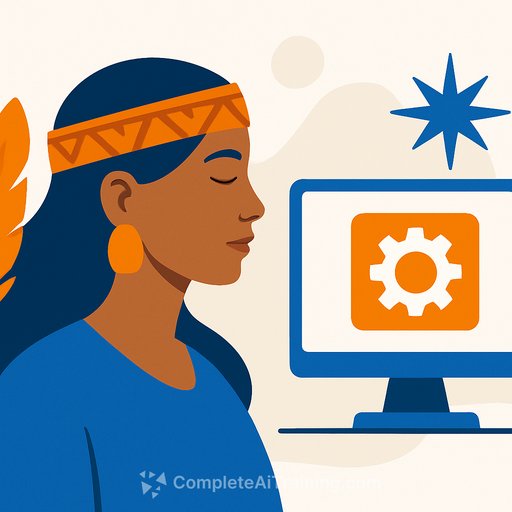Indigenous Identity Is Being Misrepresented by AI - Is Your Business Part of the Problem?
AI is rewriting how stories are made. The question is simple: are your prompts honoring Indigenous communities, or flattening them into clichés?
This is a brand risk, a product risk, and a people risk. It's also a chance to build trust by doing the work right.
When AI violates consent
OpenAI's Whisper was trained on thousands of hours of audio that included te reo Māori. Advocates called this "digital re-colonization" because the language data appeared in systems without community consent or guardrails.
Language is identity. When models ingest Indigenous languages without permission, they strip communities of agency over stories, speech, and heritage. That's exploitation, not innovation.
Accuracy matters: avoid flattening cultures
Adobe saw backlash after AI-generated stock images tagged "Indigenous Australians" showed generic, inaccurate markings. Sacred symbols were treated like costume details.
Inaccurate depictions say Indigenous identity is a prop. That message damages trust, harms culture, and signals your brand cannot be trusted with nuance.
Stereotypes in image generators
Prompt "Native American" into popular image tools and you still see feathered headdresses, war paint, and tipis. It looks like old Hollywood.
Indigenous people today are technologists, founders, artists, academics, and leaders. AI that can't see the present repeats the past-and erases real lives.
Why PR, Communications, IT, and Founders should care
Misrepresentation is a credibility hit waiting to happen. It can trigger public backlash, platform takedowns, and legal scrutiny around rights to data and likeness.
Beyond risk, there's responsibility. If you publish with AI, you shape perception at scale. Your choices either reinforce stereotypes or build belonging.
How to get it right
1) Audit your AI output
- Run a bias check: does the content flatten a culture into a costume, trope, or "ancient only" narrative?
- Blocklist stereotypical terms and visual cues in your prompts and templates. Add negative prompts that exclude clichés.
- Use a pre-publication review that includes cultural accuracy and consent checks-treat this like legal review.
- Document model, dataset notes, and prompts for each asset. If you can't explain how it was made, don't ship it.
2) Respect data sovereignty
Indigenous data sovereignty means communities control how their data-language, stories, images-is used. If consent is unclear, do not use it.
- Vendor due diligence: ask how Indigenous data is sourced, licensed, and governed. Get answers in writing.
- Choose tools and datasets that follow Indigenous-led protocols and benefit sharing.
- Adopt policies aligned with groups like the US Indigenous Data Sovereignty Network and the Indigenous Protocol and AI Working Group.
3) Consult and partner with Indigenous experts
- Bring Indigenous advisors into scoping, design, testing, and sign-off. Pay for expertise.
- Co-create assets with Indigenous creatives and technologists when content features their communities.
- Set a feedback loop: if concerns arise post-launch, act fast with fixes, credits, and compensation where appropriate.
Quick checklist by role
- PR and Communications: Add a cultural accuracy review to your content calendar. Prepare a response plan for AI-related misrepresentation incidents.
- IT and Development: Configure prompt guardrails, negative prompts, and safety filters. Log lineage for all generated assets and enforce dataset provenance checks.
- Leaders and Product Owners: Set policy: no Indigenous content without consent, accuracy review, and community benefit. Make it part of your procurement and launch gates.
Final thoughts
AI isn't neutral. It mirrors whoever trains and deploys it. If your business uses AI, use it with intention-seek consent, validate accuracy, and involve the people represented.
Don't let convenience outrun responsibility. Choose tools and practices that protect culture and earn trust.
If your team needs practical workflows for bias-aware prompting, editorial reviews, and dataset due diligence, explore role-based training here: Complete AI Training - Courses by Job.
Your membership also unlocks:










